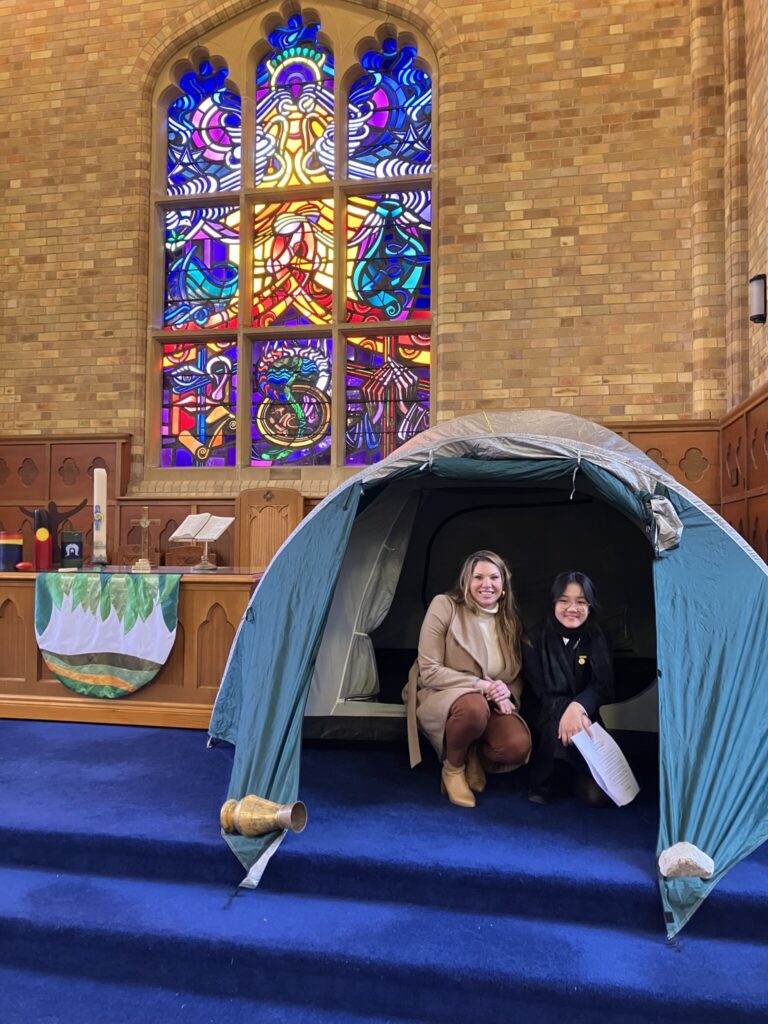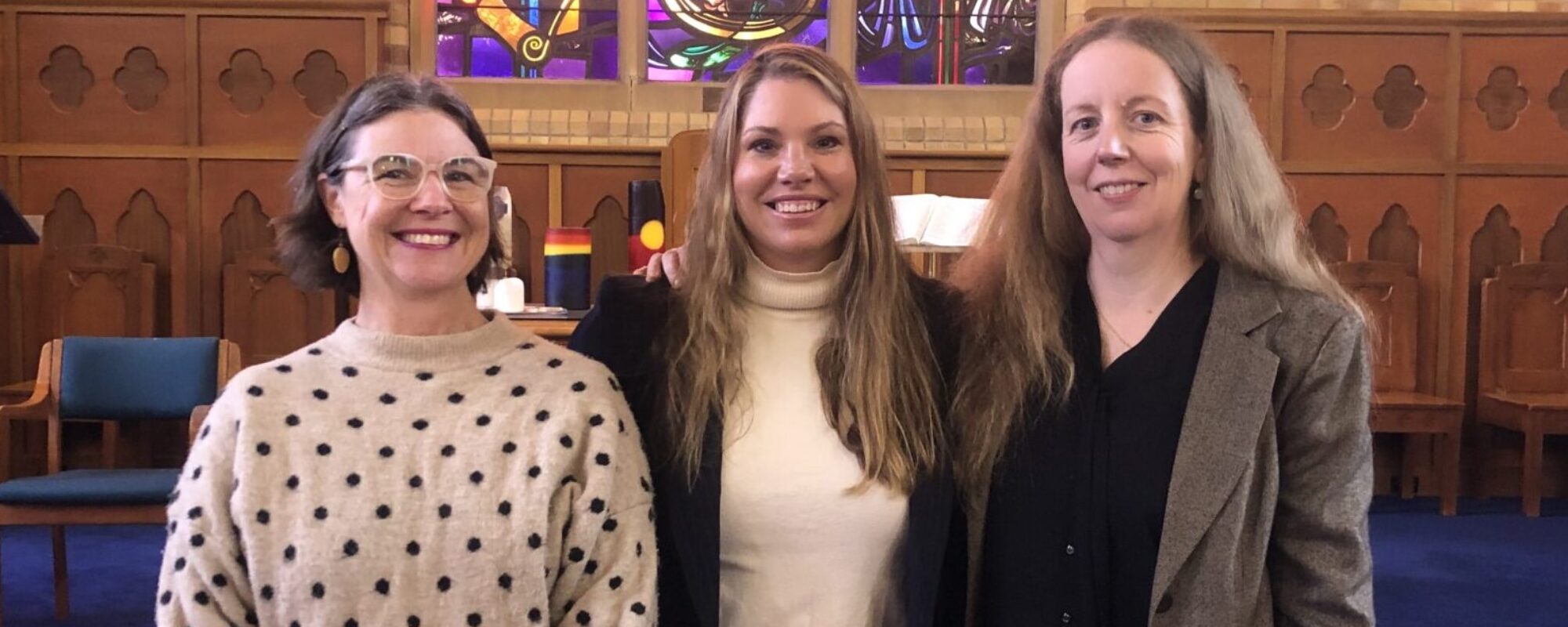From the Chaplains
Refugee Week 2024
“Keep on loving one another as brothers and sisters. Do not forget to show hospitality to strangers, for by so doing some people have shown hospitality to angels without knowing it.”
Hebrews 13:1-2
I have recently made some new friends.
They are five women – a mother, let’s call her Bibi, and her four adult daughters, aged in their 30s. Let’s call them Asal, Benesh, Esin and Hesther.*
Bibi’s husband, the girls’ father, was killed in ethnic conflict in Afghanistan. Their brother is missing.
Bibi is a smart woman; quiet, sharp and observant. Her first language is Farsi. She doesn’t speak any English. She’s a good communicator.
Asal is the spokeswoman for the family – her English is good, she is determined to lead her family out of the circumstances in which they find themselves. She has a sweet and generous nature, always putting others first.
Benesh speaks a little English, as well as Arabic and Farsi. Her dearest hope is to work and contribute to Australian society.
Esin is very quiet. She has not been well; her medication ran out some months ago and she has not been able to access anymore because until recently she was not linked into the Medicare system, despite having been in Australia for seven months.
Hesther, the youngest daughter, is a bit of a firecracker. She talks a lot, has a lot of opinions and is quick to jump to the defence of her family if she perceives a potential problem. She loves to chat and laugh.
All four daughters are well educated and have been attending English classes at TAFE NSW ever since they arrived in Sydney. Their biggest hope is to have their qualifications recognised in Australia and be able to work and continue their study.
The family arrived in Australia legally from Afghanistan via Iran and then Pakistan last December, on humanitarian visas. The subclass humanitarian visa that they were granted is “available to people who are outside their home country and are subject to substantial discrimination amounting to a gross violation of human rights.”
A friend and I have been trying to support this family to navigate the overwhelmingly complex bureaucratic labyrinth of Centrelink, Medicare, the Department of Immigration and other departments.
This experience is like being trapped in an absurdist Kafka novel – my first phone call to Centrelink went like this:
E: Hello, I would like to please make an appointment on behalf of a family of five refugee women who need to be linked into the system.
Centrelink: Yes, sure, can I please have their reference number?
E: Well, they don’t a reference number, because they are not in the system yet. That’s why I’m calling.
Centrelink: I’m sorry, you can’t make an appointment without a reference number.
…
Despite having been in Sydney for seven months, they are still not receiving the support their visa entitles them to, including medical support, because of complications with their sponsor family, who were meant to have been supporting them but have not been.
They had to leave the apartment they were living in, and are now living altogether in one room of a friend’s house.
The four daughters are trying as hard as they can to find work, any work. So far they have three part-time jobs between them. Their goal is to earn enough collectively to be able to pay rent on their own cheap apartment, so that they don’t need to rely on their friend any more.
A friend of mine gave them two column heaters. They switched them on for the first time last week, as they could not afford the electricity bill. Rent took priority.
This is just one story of one refugee family in Sydney, Australia.
There are thousands of other stories.
This week is Refugee Week.
The Scriptures, both Hebrew and New Testament, are full of exhortations and commands to care for the stranger, to show hospitality and seek justice for the foreigner. As it says in Micah 3:5, to not “deprive the foreigners among you of justice”.
The Uniting Church in Australia has a proud history of advocating for refugees and asylum seekers; some of the most voiceless people in our society. We as a church prioritise this because Jesus specifically tells us to do so.
In fact, Jesus connects the matter of eternal life itself (our ‘inheritance’) to caring for the stranger, as we see in this parable from the gospel of Matthew:
“Then the King will say to those on his right, ‘Come, you who are blessed by my Father; take your inheritance, the kingdom prepared for you since the creation of the world. For I was hungry and you gave me something to eat, I was thirsty and you gave me something to drink, I was a stranger and you invited me in, I needed clothes and you clothed me, I was sick and you looked after me, I was in prison and you came to visit me.’
“Then the righteous will answer him, ‘Lord, when did we see you hungry and feed you, or thirsty and give you something to drink? When did we see you a stranger and invite you in, or needing clothes and clothe you? When did we see you sick or in prison and go to visit you?’
“The King will reply, ‘Truly I tell you, whatever you did for one of the least of these brothers and sisters of mine, you did for me.’
So what we do for the stranger, the homeless, the refugee, the voiceless; we not only do for those brothers and sisters – we also do for God.
*These are not their real names. The women still fear persecution from elements of the Afghan community. They are fearful to go out much, even here in Sydney. For the same reason, I cannot show their photos.
In the chapel this week, to recognise Refugee Week, we have set up a tent. We want the students to understand the importance of simple human rights such as shelter, safety from persecution, dignity and hope for the future.

We want our students to grow into the kind of people who treat the ‘least’ as the greatest. The ‘last’ as the first. We want them to know that any love they show to the homeless and the voiceless, they show also to God.
I will end with a beautiful prayer, written a few years ago by a Palestinian Muslim woman and Israeli Jewish woman. It paints a picture of the future we long and hope for. God of justice, may it be so.
A prayer of mothers for life and peace – by Sheikha Ibtisam Maḥameed and Rabbi Tamar Elad-Appelbaum.
God of Life
Who heals the broken hearted and binds up their wounds
May it be your will to hear the prayer of mothers
For you did not create us to kill each other
Nor to live in fear, anger or hatred in your world
But rather you have created us so we can grant permission to one another to sanctify
Your name of Life, your name of Peace in this world.
For these things I weep, my eye, my eye runs down with water
For our children crying at nights,
For parents holding their children with despair and darkness in their hearts
For a gate that is closing, and who will open it before the day has ended?
And with my tears and prayers which I pray
And with the tears of all women who deeply feel the pain of these difficult days
I raise my hands to you please God have mercy on us
Hear our voice that we shall not despair
That we shall see life in each other,
That we shall have mercy for each other,
That we shall have pity on each other,
That we shall hope for each other
And we shall write our lives in the book of Life
For your sake God of Life
Let us choose Life.
For you are Peace, your world is Peace and all that is yours is Peace,
And so shall be your will and let us say Amen.
You can read the prayer in Hebrew, Arabic and German here here.
Edwina O’Brien
Assistant College Chaplain

